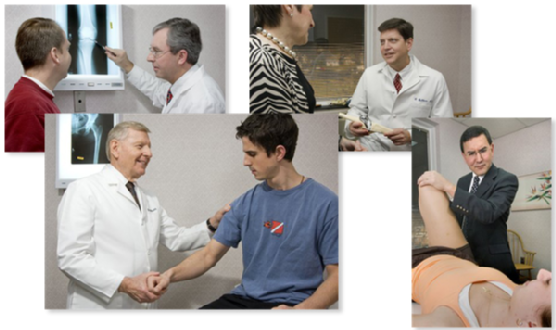
Your visit with your orthopaedic surgeon is an important meeting that can be most effective if you plan ahead. Research shows that understanding your diagnosis, and treatment plan, plays an important role in maximizing your results.
Your orthopedic surgeon is a medical doctor with extensive training in the diagnosis and treatment, both nonsurgical and surgical, of the musculoskeletal system, including bones, joints, ligaments, tendons, muscles and nerves. At our orthopaedic center you will always be seen by an orthopaedic surgeon for diagnosis and formulation of the treatment program
Be prepared to listen, and don’t be afraid to ask questions about your condition and treatment, whether basic or complex. It is important that you give your doctor all the information he or she needs and that you fully understand what your doctor is recommending.
Be sure to tell your doctor everything about yourself including your diet, any current medication or herbal supplements you’re taking, any unusual habits, and any adverse reactions to medication you have experienced.
The following checklist will help you and your doctor discuss the issues most important for getting the most out of the visit and ultimately to help establish a partnership between you and your doctor.
- Visit the physician’s web site and download the paperwork. Have it filled out and ready to go before you go in for your first visit.
- Bring all previous test reports, x-rays and MRI’s so they don’t have to be repeated or can be used as comparison to show how you are healing.
- Prepare a list of questions you would like to ask, starting with the most important issue to you.
- Bring a written list of all medications, herbs, vitamin supplements and over-the-counter medications you are taking.
- Bring a list of all medical problems, prior surgeries, and all current doctors and their locations and telephone numbers.
Be honest and complete in talking with your doctor. Share your point of view and don’t hold back information about issues such as incontinence, memory loss, sex, or other issues that you might consider embarrassing. These can go far in helping the physician make an accurate diagnosis. Be sure to stick to the point to keep the visit on track.
Take notes on what the doctor tells you, and ask questions if you don’t understand a medical term, the reason for the doctor’s recommendation, or the instructions for taking medication.
Ask what to expect from your treatment, what effect it will have on your daily activities and what you can do to prevent further disability. If you feel the communication is not going well between you and your doctor, ask for a family member or friend to go with you to the next doctor visit. This person can help ask questions, and address concerns in areas you may have forgotten.
Follow the doctor’s instructions. Take the full course of medication and make sure you follow the prescribed physical therapy or exercise routine. Remember, you have formed a partnership with your doctor. It is a team effort and requires understanding and support from both you and your doctor.
If something is confusing or does not seem right, call the doctor’s office for advice. His/her staff often knows the answer or they will ask the doctor. If you are an active participant in your own care, things always go better. Ask questions, understand treatment, follow instructions, and you will be on the road to recovery. Remember it is a joint partnership, you and doctor working together, understanding your condition, treatment and each other.
If you have an orthopaedic injury, contact the experts at Nirschl Orthopaedic Center in Arlington, Virginia. Schedule an appointment with an orthopaedic surgeon today by calling 703-525-2200 or visit our web site at www.nirschl.com. We are located on the campus of the Virginia Hospital Center in the center of Arlington, Virginia.